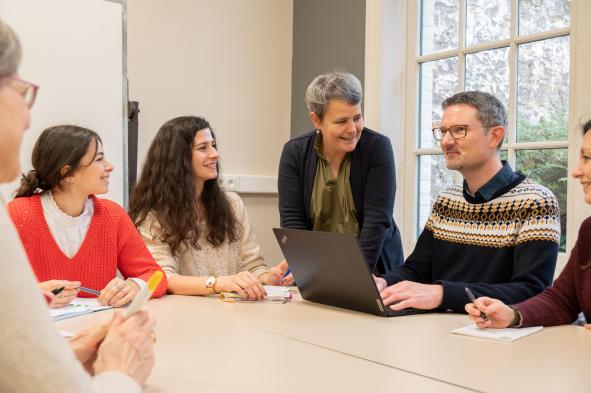Specialised Master in Supporting Professionals in Education, Management, Social Work and Healthcare
-
Schedule
staggered hours
- ECTS Credits 60

In constantly changing social, economic, political and even technological contexts, workers need to develop new skills.
Coaching can support this development. Yet when they are not supported and accompanied in this exercise, teams regularly experience burnout and suffering at work. Indeed, many managers have to take on this role without being prepared or trained in the posture of accompaniment, with all that this requires in terms of skills.
To meet this growing need, this new specialization master's degree, backed by Belgian and international resources, pursues the ambition of offering trainers, team leaders, consultants, HR managers... training in coaching teams and the professionals who make them up.

The benefits of training
- A user-friendly course format favoring exchanges between students and professors
- A pedagogy and timetable adapted for working professionals
- A training program aimed at transferring learning to specific professional contexts
- A theory/practice articulation in each teaching unit
- Expert Belgian and international teaching staff for a master's degree of excellence
Your objectives
Develop or perfect skills
- in designing, implementing and regulating innovative support systems
- in driving and managing change
- in analyzing professional practices
- in developing new knowledge
- in integrating ethical and deontological dimensions into support approaches
Course schedule
Courses are held in Namur from mid-September to mid-May on Tuesdays, Wednesdays and Thursdays from 6:10 pm to 9:15 pm and during the day on Saturdays from 9 am to 4:30 pm.
Insofar as this specialization master's degree is aimed at working professionals, it is possible to consider a lighter course to spread the program over two academic years.
The program is accessible via synchronous distance learning.
The program
A 60-credit course developed around 4 themes
The support approach in its various components
What is support, what postures does it involve? How does it play out according to context, and what tools should be mobilized?
Organizational analysis and the accompaniment of change in organizations
Strategic? cultural? systemic? approach? How to accompany change whether emerging or planned?
Practice analysis, activity analysis and reflexivity
What approaches to analyzing work situations and supporting professional development?
Analyzing relational dimensions in support
What relationship to the other and to oneself? What place for emotions in accompaniment? How can we foster a group dynamic at the service of collective intelligence?
The program includes a theoretical component (research contributions), a practical and strategic component (acts, approaches and devices), an ethical component and an epistemological component.
An integration seminar (2 credits) paces the appropriation of content throughout the year and is punctuated by an international seminar bringing together students, teachers and international guests.
The production of a dissertation (15 credits) provides an opportunity to address in depth an issue related to the accompaniment, whether in the form of a professional dissertation or a research paper. A research methodology course (2 credits) supports students in this exercise.
Contacts
Faculté des sciences de l'éducation et de la formation
Secrétariat
Place Saint Aubain, 14
5000 Namur
Tél. +32 81 72 50 69
secretariat.fasef@unamur.be
Responsable du programme
Sephora Boucenna
Tél. +32 81 72 50 63
sephora.boucenna@unamur.be
-
<unknown>
-
<unknown>